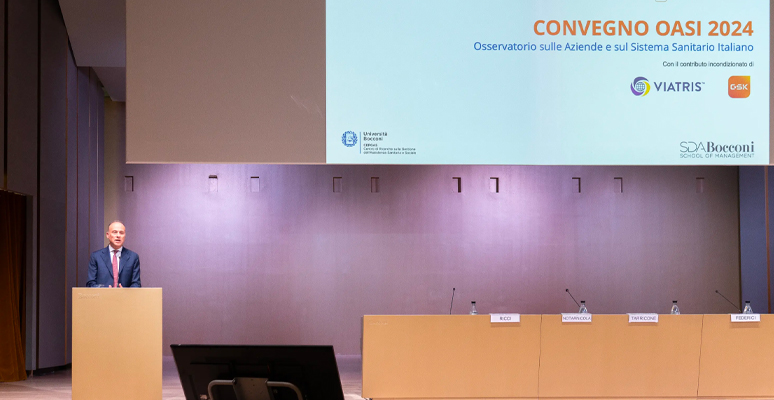
- Start date
- Duration
- Format
- Language
- 2 Apr 2025
- 16 days
- Class
- Italian
Acquire the managerial skills needed to play your organizational and managerial role effectively and govern change in the social care and healthcare system.
In recent years, it has become more painfully clear than ever that community health needs organized services and appropriate skills, as well as new models of interaction between professionals, and between professionals and patients. The NRRP can provide a reform of community care and assistance, this is the general position that SDA Bocconi’s MiMS - Master in Management per la Sanità has held for some time. The presentation of the Field Research projects that just took place on SDA Bocconi Campus also underlined the importance of the NRRP. These projects have been carried out by groups of MiMS students within Italian public and private healthcare institutions such as Asl of Alessandria, Baglivi Project, Biogen, Centro Diagnostico Medico Anxur, Fresenius Medical Care Italia, Iqvia, Paradeigma Consulting, Viatris, and Vitalaire.
We asked MiMS Director Valeria D. Tozzi to tell us about this specific learning format and its function in the broader strategy of moving into the professional world proposed by MiMS.
“Our Field Research projects are part of a wider educational approach to real-world healthcare management, basically composed of four stages. The first is an exploratory stage: it is essentially about getting to know the sector, who the players are that make it up, ranging from public entities (ASLs, hospital companies, Regions, etc.) to pharmaceutical companies and all suppliers of health technology; from private companies that provide health and social health services (nursing homes, RSAs, etc.) to the consulting industry. It is essential to understand the different operational logics, areas of intervention, and the complex network of relationships between entities that are often very different in nature.”
“Secondly, students are asked to ‘self-represent’ while working in the healthcare sector, not generically but in specific functions within the different entities. For example, those with a scientific background will probably tend to imagine themselves more naturally at pharmaceutical companies, where there are functions that require analytical, interpersonal skills etc. Each of them is called upon to question their specificities, in order to build informed expectations. To develop the full potential of a learning choice like MiMS, it is important for the students to imagine themselves within specific contexts and be aware of their own strengths and weaknesses.”
“From here to field research,” Tozzi continues, “it’s just a short step. The third stage in the process of approaching the market consists precisely in field-testing their projections, and getting to know concrete work processes. Our Field Research consists of real projects carried out within public or private companies, in which MiMS students are involved with the support of a lecturer. The latter, however, gives mainly ‘external support’, while the students’ team reports directly to a manager from the company that proposed its project to MiMS. This is an effective way for participants to understand the language, logics, working models and expectations of specific entities.”
The fourth stage is the natural conclusion of the learning journey and an integral part of it, where Master’s participants gain ongoing work experience during their curricular internship. “Unlike the process used during the Field Research projects, here students learn individually while working at a company. A reference lecturer is always there for them ‘on demand’, but once more the direct formative relationship is with their corporate counterparts, including a tutor who also participates in the final evaluation about the achievement of their educational objectives.”
Summing up, in-depth knowledge of the healthcare sector, self-representation within it, “real-life testing” of one’s orientations, and an ongoing work-based learning experience are the four elements that provide MiMS participants with a solid training enabling them to start their professional journey in healthcare management issues. “This explains, for example, why many internships turn into professional relationships that continue over time,” the Director concludes. “Sometimes the students’ initial perception of the world of healthcare is one of static and fix roles, but over the course of the Master’s they discover that the ‘health universe’ is very dynamic and thus offers competent, honest and determined people lots of opportunities.”
SDA Bocconi School of Management

Acquire the managerial skills needed to play your organizational and managerial role effectively and govern change in the social care and healthcare system.



